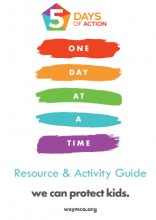Youth Development
Our Commitment to Child Protection and Safety
We are proud and respectful of the trust parents place in our YMCA. A safe environment for children combined with quality programming is an important part of our focus on youth development. Our core values of caring, honesty, respect and responsibility are part of everything we do. We place great value on providing the most child-safe environment possible and creating an atmosphere where children can grow and thrive.
Five Days of Action
Five Days of Action is a week-long campaign designed to raise awareness and inspire adults to take action to protect children from sexual abuse. This year, the campaign takes place April 15-19, 2024.
Please read a letter from Jack Fucci, President and CEO.
Creating a Child Safe Environment
We take the following steps to keep children in our care safe:
-
Detailed employment application forms.
-
Comprehensive reference checks that include standardized questions that assess risk for abuse.
-
Criminal Offender Record Information (CORI) check & Sexual Offender Registry Information (SORI) check.
-
All staff complete an extensive Child Abuse Prevention Training Program.
-
Supervisors complete additional training to further promote a child safe environment.
-
Our child care programs are licensed by the Department of Early Education and Care, and our camps are American Camp Association (ACA) accredited and are licensed and comply with all Department of Public Health regulations.
-
Children in our child care programs and camps are only released to authorized adults who are required to show a government issued photo ID or provide a secure PIN number at pick-up.Staff and volunteers are mandated to report any suspected child abuse.
-
Staff are prohibited from working 1-on-1 with or contacting youth outside of the Y (including babysitting and social networking).
-
Policies exist to ensure staff & volunteers are not alone with a child. All interaction between a staff and child must be observable and interruptible.
-
Employees who are trained in abuse prevention are more likely to understand their role as protector, to recognize the signs that abuse is occurring, and to report suspicious or inappropriate behaviors. Trained staff members are also less likely to place themselves in situations where they could be falsely accused.
How You Can Help Prevent Child Abuse
We want all children to be safe. Unfortunately child abuse does exist, taking on many forms. If we are knowledgable about abuse and can recognize the warning signs, we're better able to respond and quickly prevent it.
Types of Child Abuse
Emotional: Threatening a child or using words that can hurt a child’s feelings and self-esteem, withholding love and support from a child.
Physical: Causing injuries to a child on purpose, such as bruises, burns, scars, broken bones, etc.
Sexual: Having sexual contact in any form with a child, including exposing, fondling, intercourse, pornography, or internet solicitation.
Neglect: Not providing children with enough food, clothing, shelter, medical care, hygiene, supervision, etc.
Warning Signs of Child Abuse
- Unkempt or malnourished appearance
- Unexplained bruises, welts, or burns
- Disturbed sleeping or eating patterns
- Abrupt changes in behavior, anxiety, clinging, aggressiveness, or withdrawal
- Sexually transmitted diseases and infections
- Discomfort with physical contact
- Fear of a certain person or place
- Fearfulness or depression
- Abuse of other children
What Can You Do?
TALK regularly to your child about his or her experiences in YMCA programs, school, sports, and other activities.
DROP IN on your child’s programs.
TRUST your instincts. Don’t wait to tell us if something seems ‘strange.’ Speak up.
Learn to recognize and WATCH for warning signs of abuse.
LISTEN & WATCH for signs of your child receiving special attention that other children or teens are not receiving.
Periodically ASK your child these questions:
-
Is anyone scaring or threatening you?
-
Is anyone asking you to keep secrets?
-
Has anyone said anything to make you feel bad?
-
Is anyone touching you in a way you do not like?
EDUCATE your child about self-protection, including information about strangers and good and bad touches.
LEARN to control the stress level of yourself and family members.
COMMUNICATE with your child and really listen to their concerns.
RECOGNIZE the fact that most abuse happens by people that children know and trust.
BECOME AWARE of your community resources.
KNOW where your children are and who their friends are.
TEACH your children it’s not okay to keep secrets from you; that they can always tell you the truth.

